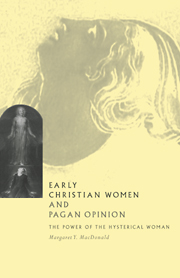Book contents
- Frontmatter
- Contents
- Preface
- List of abbreviations
- Introduction
- PART ONE Pagan reaction to early Christian women in the second century CE
- PART TWO Celibacy, women, and early church responses to public opinion
- PART THREE Marriage, women, and early church responses to public opinion
- General conclusion
- Bibliography
- Index
PART TWO - Celibacy, women, and early church responses to public opinion
Published online by Cambridge University Press: 15 December 2009
- Frontmatter
- Contents
- Preface
- List of abbreviations
- Introduction
- PART ONE Pagan reaction to early Christian women in the second century CE
- PART TWO Celibacy, women, and early church responses to public opinion
- PART THREE Marriage, women, and early church responses to public opinion
- General conclusion
- Bibliography
- Index
Summary
The main goal of Part 1 of this book was to illustrate that women figured prominently in descriptions of Christianity by non-Christians in the second century CE. New Testament evidence indicates, moreover, that outsiders also critiqued the early church in the first century. The challenge involved in studying such evidence is that the comments of outsiders are only available to us as they are communicated through early church voices. These Christian writings express public opinion indirectly, frequently couching it in language which is intended to exhort community members towards appropriate behaviour for life in the church. As we move on in Part 2 to look at the impact of public opinion on the lives of early Christian women, non-Christian reactions to the church will be compared to indirect expressions of public opinion found in several early Christian texts. Unlike the remarks of the observers examined in the previous section, the indirect expressions of public opinion cannot be analysed on their own terms; they must be studied in light of early church concerns for social respectability and the desire to respond to public opinion.
Some New Testament texts explicitly discuss church communities having been burdened by slanderous rumours (e.g. 1 Pet. 2.12; 3.15–16; 1 Tim. 3.6–7, 5.14). Even if the public reactions which triggered these early church responses lack the depth of the challenging questions posed to Christianity by an intellectual like Celsus, we must not underestimate their importance in the establishment of community values of prestige and failure.
- Type
- Chapter
- Information
- Early Christian Women and Pagan OpinionThe Power of the Hysterical Woman, pp. 127 - 182Publisher: Cambridge University PressPrint publication year: 1996

